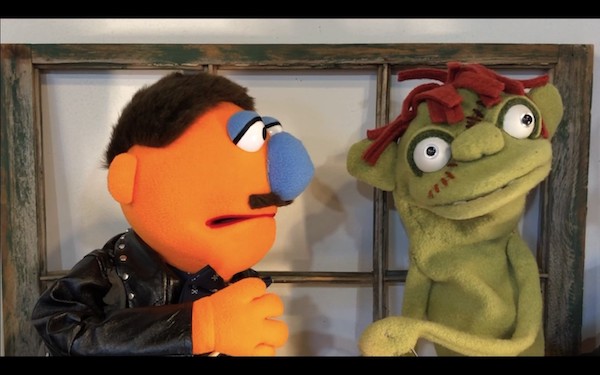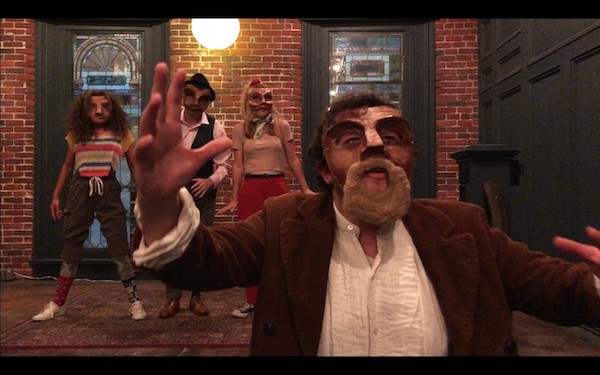Theater Review: “Tales of Chelm” — Who Is Wise?
By Debra Cash
In our intersectional age, the stories of the fools of Chelm belong on the shelves of any child with a taste for the ridiculous and — with the clarity of kids — an ability to see through self-delusion.
Tales of Chelm, staged by the Jewish Arts Collaborative’s Theaterworks. Online February 3, 10, 17 and 24.

Tales of Chelm — To Catch a Thief. Photo: JArts
Chelm (pronounced Helm with a guttural ch, as in Bach) is a real place: I have a friend whose ancestors emigrated from there. A town in southeast Poland 65 kilometers southeast of Lublin that at the beginning of World War II had a population of 18,000 Jews — 60% of the town’s inhabitants — numbered only 60 left after the Holocaust.
Yet Chelm has lived on in legend as a place where the Jewish townspeople, the Khelemer khakhomim, have more piety than common sense, and where, upon coming into contact with Jews and gentiles from surrounding towns — real cities and invented places with names like Yenemsvelt (the boondocks) and Yichupitz (nowhere land) — they invariably take the wrong lesson from their encounters.
Chelm tales date back to the late 19th century and illustrated stories of Wise Men of Chelm have pride of place on many American Jewish childrens’ bookshelves. (I’m particularly fond of the versions illustrated by Uri Shulevitch, and the Maurice Sendak versions in Isaac Bashevis Singer’s Zlateh the Goat.
In our intersectional age, the stories of the fools of Chelm belong on the shelves of any child with a taste for the ridiculous and — with the clarity of kids — an ability to see through self-delusion.
Boston’s Jewish Arts Collaborative is offering free, bite-sized tastes of Chelm stories to take families through the cold evenings of February. A new episode — ranging from five to 15 minutes in length — will premiere online every Thursday at 8 p.m. EST.
Adapted by Jesse Garlick and Dori Robinson from versions by Texas rabbi Seymour Rossel, each tale is told using different theatrical methods — shadow puppetry, hand and rod puppets, masked work, and storytelling/live action, all performed by the ensemble of JArts TheatreWorks Group. The results are as mixed as their methods. The simple black-and-white shadow puppets, designed with a charming Ashkenazi Jewish papercut aesthetic to introduce the story of how Chelm came to be overpopulated with fools (spoiler: the bag of foolish souls an angel was carrying broke and everyone spilled out), has a nice sense of specificity but a distracting screen that looks like it’s been daubed with Wite Out and a sound mix that garbles the best lines. In To Catch a Thief, Gedaliah the Goniff (Yiddish for thief) and policeman Zalman Shlomo the Gatekeeper (who for some reason slips in and out of a vaguely American Southern accent) are the ultimate symbiotic odd couple, agreeing that they can go out for a “final nosh” at a nearby restaurant before the goniff’s arraignment. This is the most successful of the four episodes, and kids will love the way it channels the Muppets — although I don’t know how the Henson family will feel about it.

Tales of Chelm — How the Chelmites Stole the Moon. Photo: JArts
There are real problems in JArts Theatreworks’ How the Chelmites Stole the Moon, the story of how the Chelmites tried to capture the moon — actually, its reflection — in a barrel. The slapdash execution, with actors loudly geshrieing behind generic masks and the hand-held camera bobbling along, makes the story hard to follow, and the closeup shot where the townspeople look into the barrel may be too creepy for little kids.
But I’m more concerned that the JArts artists don’t seem to know much about basic Jewish customs. I was fine — nay, delighted! — when in How the Town of Chelm Came to Be God had a woman’s voice, and have no problem with the “wise men” being wise people: any shtetl populated only by guys with beards is no place for 21st-century kids to play. But this version of How the Chelmites Stole the Moon implies that the Jews pray to the full moon. First of all, Jews don’t pray to the moon: we bless it to mark the changing month. More importantly, that monthly prayer for the moon is the new moon, not the full moon. Didn’t anybody involved in this production know enough to catch this basic mistake? When a Jewish organization is promoting the pleasures of connecting with Jewish folklore and identity, that’s a disappointing lapse.
Robert Cope makes an appealing storyteller in the final Tales of Chelm episode, The Winter of Discontent. Shot in Mill No. 5 in Lowell, this medley of Chelm motifs eventually settles on sharing the story of the Chelmites recognizing their town’s unfair income distribution and traveling to Lvov to buy some justice. You could take a story like this in a much more imaginative and timely direction, and again the sound mix leaves a lot to be desired, but the tired donkey’s ride back to Chelm is a deliciously unexpected tip of the hat to another children’s classic.
As a long-time freelance writer and adjunct professor, I leave you with my personal favorite Chelm joke:
A Torah teacher in Chelm was speaking with his wife.
“If I were Rothschild, I’d be richer than he,” he said.
“Ridiculous,” his wife said. “If you were Rothschild you would both have exactly the same amount of money.”
“That’s true,” he smiled. “But I’d do a little teaching on the side.”
Debra Cash, Executive Director of Boston Dance Alliance, heard Chelm stories before she could read them to herself. She is a founding contributor and Arts Fuse Board member.
Tagged: Debra Cash, Dori Robinson, Jesse Garlick, Jewish Arts Collaborative

Apparently critic Debra Cash has not seen a single Disney movie. Because just about all of them have parts that are far creepier than what she referenced above.
(Side note: the Jews weren’t praying to the moon. Debra Cash committed a type 2 error here.)
I thought the pieces, though imperfect, were delightful, particularly in light of the tiny budget and short timeframe.
Many years ago I read an article in Spin magazine in which the writer described the band Phish as “jazz, atonal crap.” They are, objectively, neither jazz nor atonal. It was then that I realized that critics at well-known publications can incorporate into their pieces both worthless opinions and a complete disregard of the facts.